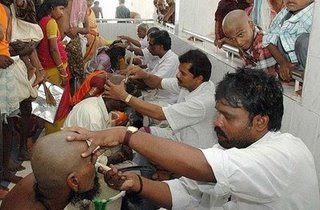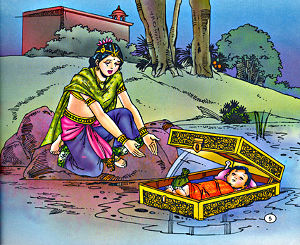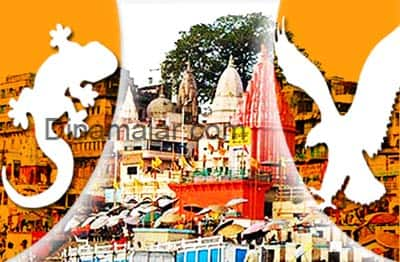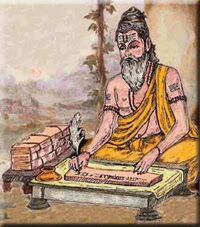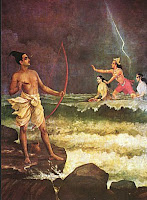Why MA Kunti Did not Keep Karna with her ?
Why MA Kunti Did not Keep Karna with her ?
Women suffer when they "step out of line" from society's diktats.
Men don't have the same consequences when they step out of line.
Kunti was born in one family, given over to another to be raised, became a single mother by accident, disposed her "shame" in the river, married into an ancient clan to a sickly king, was widowed before her time, was burdened with upbringing of 5 sons in a family where she and her sons were unwelcome, suffered assassination attempts on her sons and even herself !
.
In those days, life was tough for women. Not just in India, but the world over. They had no position or power without the support of their father, brothers, husband, sons or other male relatives. Its because of this, that in pre-modern world, women used to dote on sons rather than daughters.
Desperate for support just to survive, Kunti kept reminding Krushna that it was his social and moral responsibility to protect her. As her nephew, socially and morally, Krushna was responsible for looking after her and her sons. As a nephew with considerable political and social clout, he was doubly responsible for supporting her. Kunti’s constant complaints of “feeling abandoned” were her way of pleading for support.
Many, including Karna, blame the war on Kunti because she did not keep Karna.
As an adopted, unmarried, princess, in the household of a haughty King, Kunti could not have kept Karna without bringing shame on her parents or the adopted parents. Kunti could never have married Pandu if he had done that.
Abandoning Karna was the only option she had at the time. She did the best to make sure he was secure, but beyond that, she could do nothing for her first born. Kunti herself was under the protection of others at the time and she wasn’t independently wealthy or powerful enough to support an illegitimate child.
Kunti, as a woman, widow and a "poor-relative-to-the-king" couldn't acknowledge Karna. Social and political backlash for her and her "other sons" forced Kunti to remain silent. However, what compulsion did Surya have for keeping his silence ?
As a divine being, he could have helped or acknowledged Karna at any point, why didn't he ? Surely, being called "Surya-putra" would have served Karna better than being called "Suta-putra". Why did the Sun not offer that solace to his own son ? There are hundreds of examples in the Indian mythology and historical lore, where one parent abandons a child but the other parent assists (eg Shantanu, Ganga and Gangeya !).
Kunti's pain at seeing Karna during the princely contest, and not being able to reclaim him, must have been heartrending. Here was her first born, being insulted as a "suta", yet she couldn't stand up for him and give him his due place in that large assembly.
Seeing her Karna crowned as the king of Anga made her happy, but knowing this tied him to her enemies, worried her. Knowing Karna to be the opponent of her other sons would have been difficult too, but, as a widowed queen, with sons who are not born of her own husband, how could she now claim one more ? As it is, her position at court was rather tenuous at best. Her sons were already a thorn in the side of the ruling king and he had never accepted her other children as "true sons of Pandu". To add Karna to her brood of children with dubious parentage at this stage was impossible. Royal protocol or the social protocol of the time would not allow it. Even now, people would not accept it.
After the years living incognito, she came back to find Karna was an entrenched enemy of her sons. To add to this, Karna hated the woman her legitimate sons had married. Karna was smarting with Draupadi’s public insult during the swayamvar. His revenge on Pandavas and Draupadi came in the form of terrible insults during and after the game of dice. How could Kunti forget that at the dice game, her eldest son spearheaded the shameful assault on Drupadi and her sons. It was too late to claim any relations now. There was no love lost between her sons.
Like all politicians, Vidur, Bhishma and Krushna must have known this secret but kept their peace so as to use this knowledge as a bargaining chip in the future. Krushna would have known this secret as an astute politician and a close family member. All families have hundreds of secrets, some too shameful to be mentioned. An aunt's indiscretion at a young age would have been one such terrible secret. As a nephew, Krushna only used this terrible secret to help his cousins in dire circumstances.
Kunti only went to Karna as a last resort to stop the war. In desperation, and for sake of peace, Kunti was willing to die a thousand deaths that a shamed widow would be forced to live if Karna’s identity was disclosed. For peace, she was willing to be vilified by all those who had honoured her previously. For an ex-empress, this was worse than death. It was going to be hell on earth for her. But, Kunti was willing to suffer it for peace.
Karna spurned her though and refused to acknowledge her as his mother ! His bitterness was such, he did not want to be Kunti's son. Years of feeling unable to “fit in” with either kshatriyas or sutas, his mind was now in a terrible turmoil. Had Pandu been alive to adopt him, it was one thing, but, as an illegitimate son of an unmarried princess, his position in society was very uncertain. Out some sense of decency though, Karna promised not to kill 4 of her sons, reserving his hatred for Arjun alone.
The pain of acknowledging Karna as her son, even after the battle, must have been like thousand daggers for Kunti. She didn't have to claim him. He was dead. He was a defeated enemy. Kunti could have kept quiet. However, she didn’t. Kunti reclaimed in death what she could not own up to in life. She did it to make sure that atleast in death, Karna was given his rightful dues as a warrior and not a suta. She may not have taken sufficient care of his mortal body, but his immortal soul would never suffer loss of rites and recognitions that were due to him.
What more could a mother do for her illegitimate son ?
Oh the pain of single transgression !
Kunti’s pain and sorrow at seeing her grandsons die exceeded the pleasure of seeing her own sons live. Here was a widow with no hope of securing her family’s continuance and nothing to show for all her sacrifices. Her only great-grandson was still-born. If Krushna hadn’t stepped in, she would have lost all hope and her son’s victory would have been in vain.
Despite all the pain of the past, Kunti carried on doing her duty towards all her elders. She even went to the forest with them, knowing full well she would never come back alive.
Later bhakti acharyas have often lauded Kunti as an ideal bhakta – devotee. Kunti’s faith in Shri Krushna never wavered. She treated him as her dearest nephew and a divine personality. As a result of her relationship, sambandha, she was able to “demand” Shri Krushna’s support and protection.
Kunti was a remarkable person. She raised five powerful sons against all odds. Despite all that Kunti suffered, she never lost her sense of duty towards her elders, or her responsibility towards her children. Kunti was inspirational in her performance of her duties as a daughter, wife, queen, mother, aunt, sister-in-law and a great devotee.
http://www.pushti-marg.net/bhagwat/Mahabharata/Kunti.htm
RatThe: Kunti and Karna




